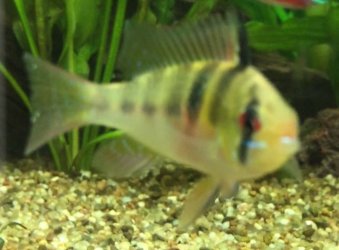I bought four Blue Rams last weekend. One female (the largest of the four) has developed 3 small white spots on its tail, which I first saw about three days ago. It is feeding well and not scratching on rocks or anything. There are no signs of spots on any of the other fish in the aquarium. Is it Ick or something else?
The picture is a bit out of focus (the thing wouldn't stay still long enough), but I think the spots are clear enough; all are close to the rear edge of the tail, two close together in the centre and one near the top .
The picture is a bit out of focus (the thing wouldn't stay still long enough), but I think the spots are clear enough; all are close to the rear edge of the tail, two close together in the centre and one near the top .

